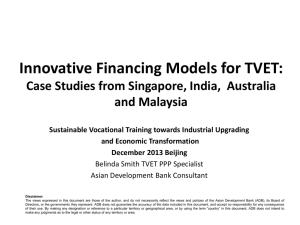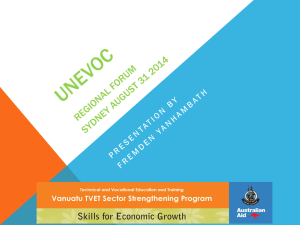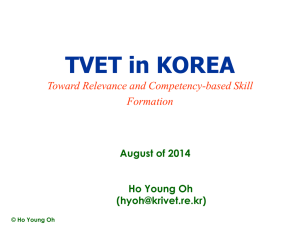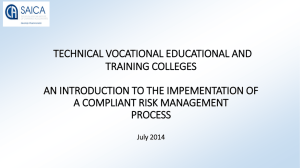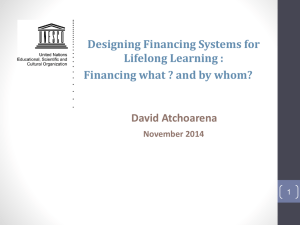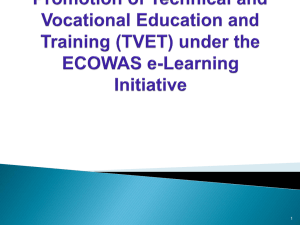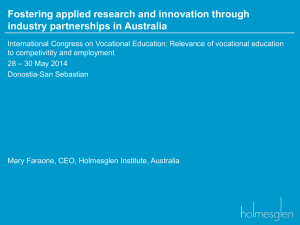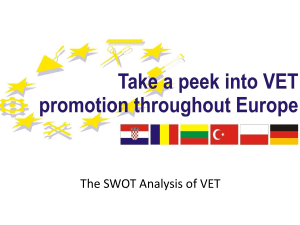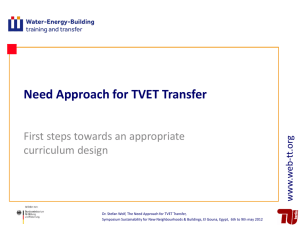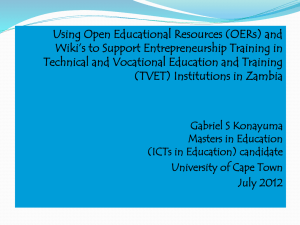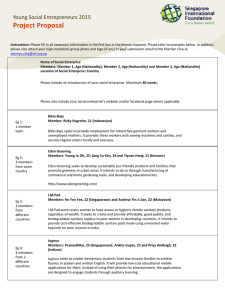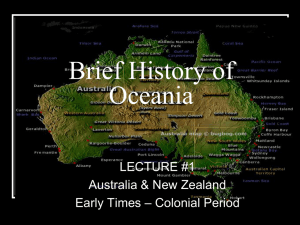PPT - TAFE Directors Australia
advertisement
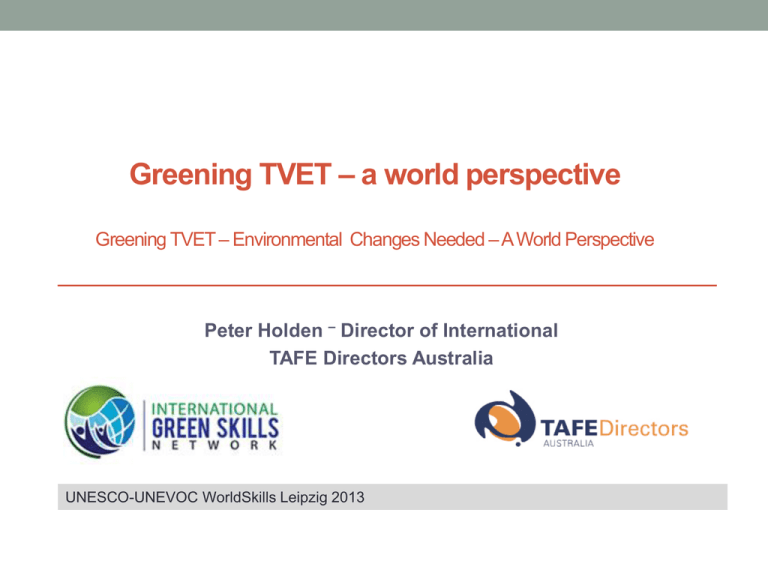
Greening TVET – a world perspective Greening TVET – Environmental Changes Needed – A World Perspective Peter Holden – Director of International TAFE Directors Australia UNESCO-UNEVOC WorldSkills Leipzig 2013 Objectives of presentation • Current developments in Greening TVET worldwide • Australia as a case study • What is needed to enhance the uptake of green skills? • Conclusion Action across the world – a snapshot • Decade of Education for Sustainable Development (2005-2014) • National Centre for Sustainability, Swinburne University, • • • • • Australia – work in TVET – 2001+ Guidelines and Recommendations for Reorienting Teacher Education to address Sustainability – France 2005 ARIES – Research work in Australia 2004 + Mainstreaming Environment and Sustainability in Africa (MESA) Universities Partnership Education for Sustainable Development Innovations Course Toolkit – UNEP 2006 Australian Government - The Green Skills Agreement (GSA) – 2009 Bonn Declaration at UNESCO World Conference in Germany 2009 An Agreement between the Australian Government and the state and territory governments Actions around the world - 2 • University of Gloucestershire online resource: Education for • • • • Sustainability in Higher Education – 2011 Education for Sustainable Development Country Guidelines for Changing the Climate of Teacher Education to Address Sustainability: Putting Transformative Education into Practice- Jakarta 2011 Learning for the Future – Competences for Education for Sustainable Development – UNESCO 2012 Greening TVET for Sustainable Development – e Forum 2012 Networks established across the world including UNEVOC Network, SEED, AASHE, Forum for the Future, ACTS, The International Sustainable Campus Network (ISCN), International Green Skills Network, Sustainable Development Action Networks etc Current thinking in Greening TVET - 1 • Greening TVET not only about green jobs and greening TVET • • • • concepts but it should also incorporate societal and cultural aspects TVET should not only impart technical and specialized knowledge but also develop systemic thinking and acting, values for sustainability and attitudinal change To achieve these competencies teachers have to allow students to develop independence and a degree of responsibility – EfS principles TVET should provide individuals with the knowledge, skills and competencies that will enable them to participate in social change TVET should promote a culture of economically, environmentally and socially sustainable development as a central feature Current thinking in Greening TVET - 2 • A model for greening TVET with five central working areas: • a green campus for training in – a living laboratory • a green technology programme to provide the skills needed for clean and green jobs • a green community – extending sustainability beyond the campus • a green research culture • a green culture within the organisation Adapted from: Greening TVET: Connecting the Dots in TVET for Sustainable Development by Prof. Shyamal Majumdar, Ph.D. Australia as a case study • COAG Green Skills Agreement • The International Green Skills Network • Seed funded through Australian Federal • • • • Government – The Skills for the Carbon Challenge Based on a strict set of criteria for membership Launched September 2012 30% of TAFE in Australia are members and more each week Established links with other international networks – China, USA and Europe Purpose of IGSN: ‘transition to best practice green skills integration in learning and teaching’ National uptake of Green Skills Green Skills/ energy efficiency training enrolments (Aust 2008 – 2010) Source NCVER Students and courses database) What is needed? • TVET should work more closely with businesses with good • • • • • • Corporate Social Responsibility to learn from them Increase awareness of new innovations and research outcomes regarding green TVET issues Improve communication between green TVET experts and technical subject experts Develop more experts in the field of green TVET Improve teacher training and professional development Continuously invest in up-to-date teaching resources to support Education for Sustainability Commitment at all levels of educational institutes to greening TVET In conclusion • A range of successful activities have enhanced the process of Greening TVET • Decade of Education for Sustainable Development (20052014) has had a significant impact • There is still more to be done • ‘Green’ is a great vehicle for change and innovation Contacts THANK YOU Peter Holden – TAFE Directors Australia Director for International Email: pholden@tda.edu.au Telephone +61 2 9217 3180 Linda Condon -- TAFE Directors Australia Director International Green Skills Network Email: lcondon@tda.edu.au Telephone: + 61 2 9217 3180 Mobile +61 (0) 410 569 364 Facsimile: + 61 2 9281 7335| Website: www.tda.edu.au

